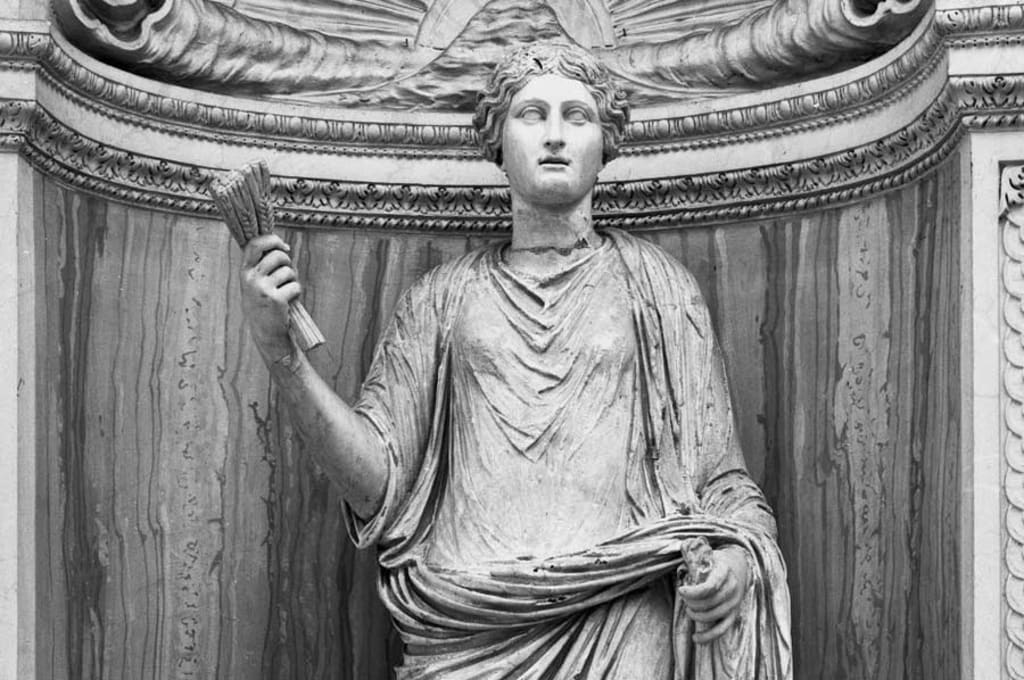"Demeter: The Mighty Goddess of Agriculture, Fertility, and the Harvest"
"Exploring the Myths, Legends, and Significance of the Greek Goddess of the Earth"

Demeter was the goddess of agriculture, fertility, and the harvest in ancient Greek mythology. She was one of the twelve Olympian gods who lived on Mount Olympus and was the daughter of Cronus and Rhea. She was known as the goddess of the earth and was often depicted as a mature woman holding a sheaf of wheat or a cornucopia, symbols of the abundance she provided.
One of the most famous myths involving Demeter is the story of the abduction of her daughter, Persephone. Persephone, also known as Kore, was the goddess of spring and the daughter of Demeter and Zeus. Hades, the god of the underworld, saw Persephone and fell in love with her. He decided to abduct her and take her to the underworld to be his queen. Demeter searched everywhere for her daughter and in her grief, caused the earth to become barren and dry. The other gods, worried about the fate of mankind, intervened and Zeus ordered Hades to release Persephone. But before letting her go, Hades made her eat a pomegranate seed, which forced her to return to the underworld for a part of each year, during which time Demeter would again grieve and cause the earth to become barren. This myth is often seen as an explanation for the changing of seasons, with Persephone's return to the underworld representing the descent into winter, and her return to the earth representing the arrival of spring.
Demeter was also known for her role in the Eleusinian Mysteries, one of the most important religious festivals in ancient Greece. The festival, which was held every year in the city of Eleusis, honored Demeter and her daughter Persephone, and was believed to bring fertility and prosperity to the land. Initiates of the Mysteries were sworn to secrecy about the details of the festival, but it is known that it included rituals, processions, and the reenactment of the story of Persephone's abduction and return.
Demeter was also associated with the creation of the corn-mother, a goddess in the form of an ear of corn, who was believed to have brought agriculture to mankind. Demeter was often depicted holding a cornucopia, a symbol of the abundance she provided.
Demeter was also known for her role in the punishment of King Erysichthon of Thessaly, who cut down a grove of trees sacred to Demeter. As punishment, Demeter caused Erysichthon to suffer from an insatiable hunger that could not be satisfied, no matter how much he ate. Eventually, he was reduced to eating his own flesh and died.
Demeter's power and importance in ancient Greek religion and culture is demonstrated by the many temples and shrines dedicated to her throughout Greece. Even today, Demeter is still revered as a goddess of fertility and the harvest, and her story continues to inspire and captivate people.
Demeter also had a special relationship with the city of Eleusis, where the Eleusinian Mysteries were held. She was said to have taught the people of Eleusis the secrets of agriculture and gave them the gift of the corn-mother. In return, the people of Eleusis built a temple to Demeter, where they could worship and honor her.
Demeter was also associated with healing and was considered to be a goddess of medicine. She was said to have created the first healing herbs and taught the art of medicine to Asclepius, the god of medicine. She was also believed to have the power to heal the sick and bring fertility to the barren.
In art, Demeter was often depicted as a mature woman, dressed in a long robe and holding a cornucopia, a symbol of the abundance she provided. She was also sometimes depicted with her daughter Persephone, often with Persephone holding a pomegranate, a symbol of her time spent in the underworld.
In conclusion, Demeter was a powerful and important goddess in ancient Greek mythology, associated with many aspects of agriculture, fertility, and healing. Her story of the abduction of Persephone and its relation to the changing of seasons continues to be a source of inspiration and fascination for many people today. Her association with the Eleusinian Mysteries and the city of Eleusis also demonstrate the significant role she played in ancient Greek religion and culture.
About the Creator
Paul Andrew
I'm a storyteller & content writer with 2 years of experience. Crafting engaging articles & blog posts on a variety of topics. Let's explore the world through my words!






Comments
There are no comments for this story
Be the first to respond and start the conversation.